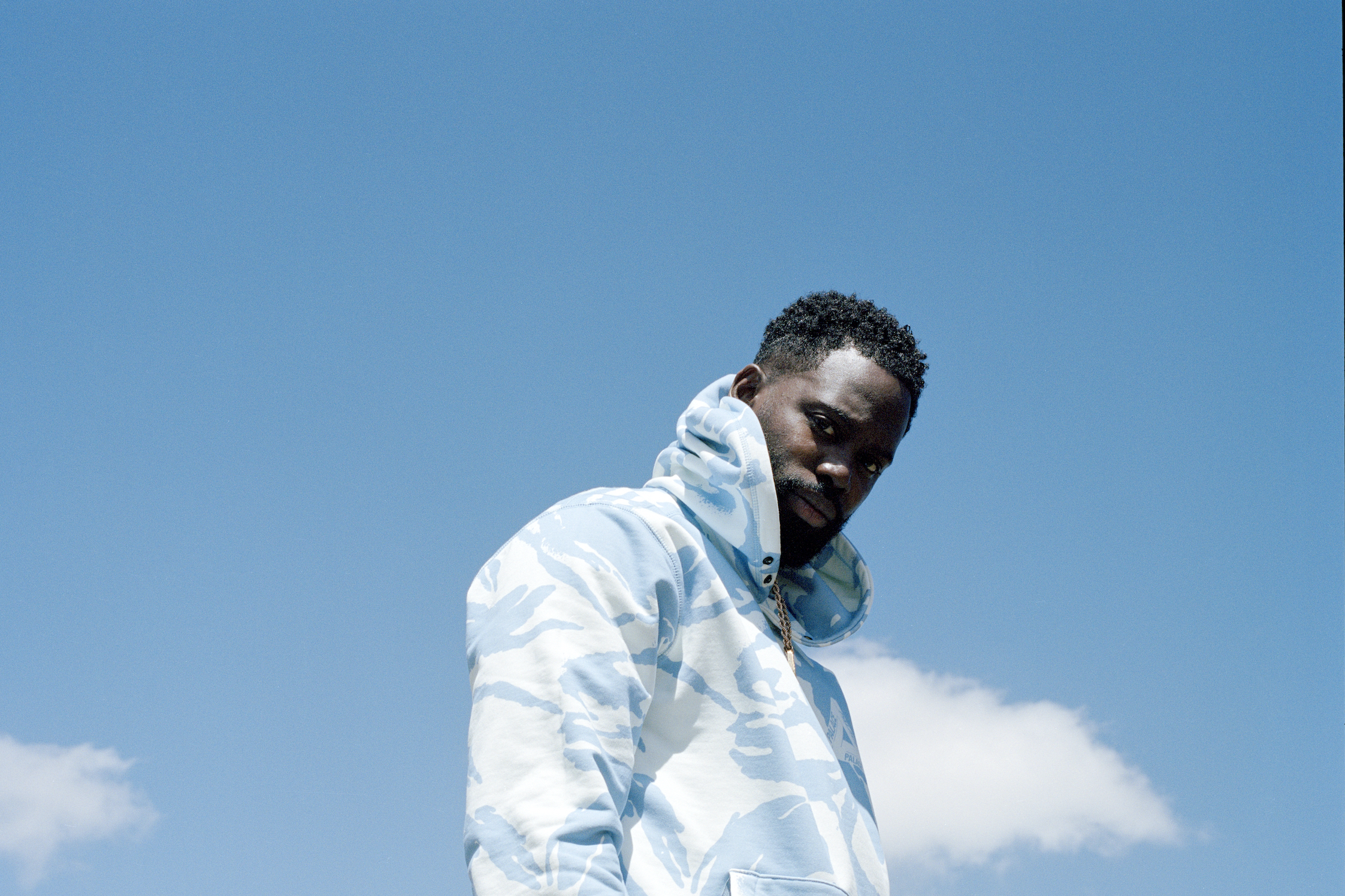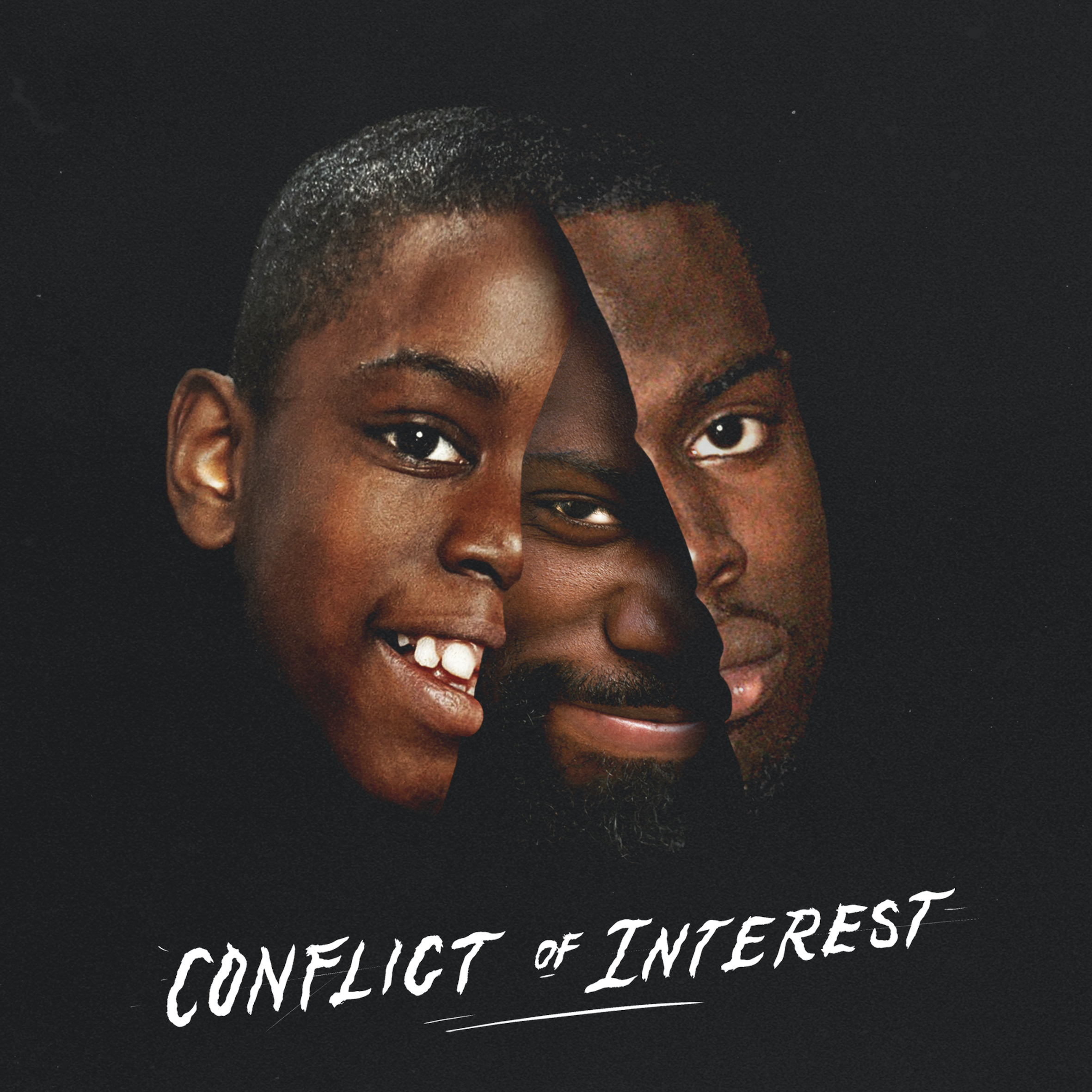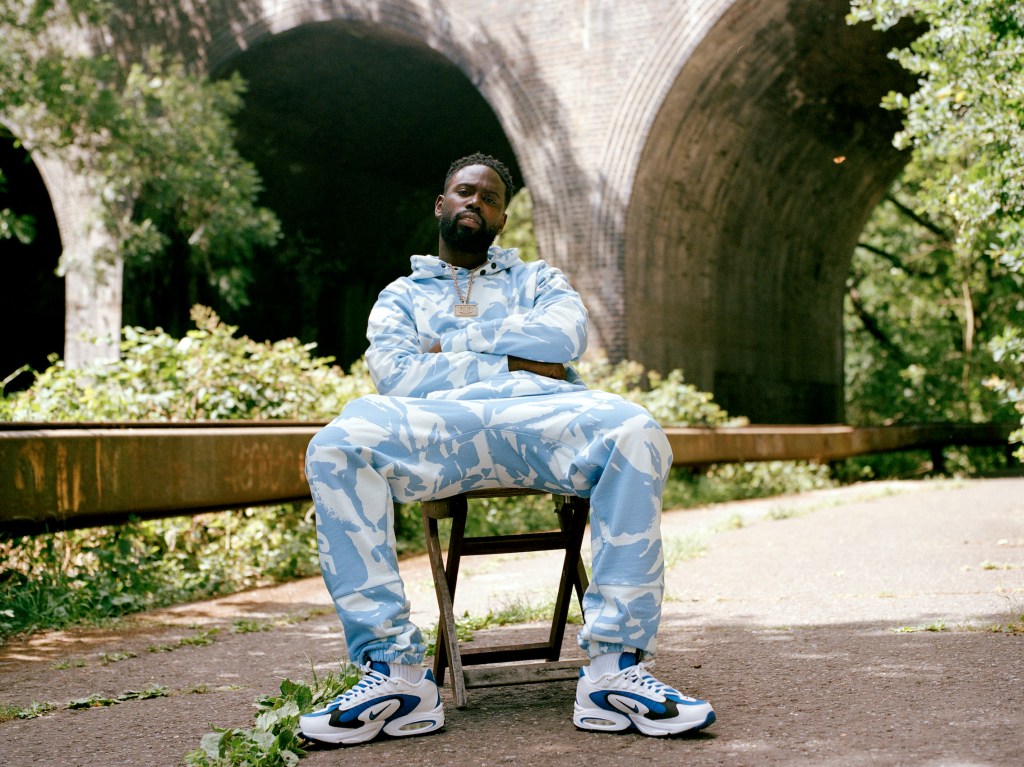“Sorry bro, I’m just making some toast.”
As we’re preparing to speak on Zoom, Ghetts is getting breakfast ready. He potters around his kitchen, spreads some butter and immediately washes the knife up in the sink. My mumsy would describe that as “good home training”. At one point his AirPod headphone falls out, narrowly missing the soapy water.
Videos by VICE
It’s a week before his major label debut Conflict of Interest lands and there’s a serenity about the UK grime artist. Even the gun-finger-inducing cameo of his Mr Hyde-like Ghetto persona on album single “Skengman” feels smooth and controlled; more sniper rifle than shotgun. In recent years, his jagged and irreverent delivery has softened into something cooler as he’s served up show-stealing features on seminal modern-day grime albums like Stormzy’s Gang Signs and Prayer and Kano’s Hoodies All Summer. Now it’s his turn to lead.
“I ain’t trying to fit in nobody’s world anymore. I’m creating my own world. And you’re welcome to join me. Everything you’re seeing is man’s brainchild,” he tells me, speaking with calm conviction from his kitchen table.

If you grew up when grime really blew up in the mid-2000s, Ghetts has to be in your top three selected MCs. His highlight reel is ridiculous: a GOAT freestyle on his doorstep (“What’s happening? What’s really good cuz? What’s crackling?”), 102 bars fired straight at Wiley’s head-top during the Movement / Boy Better Know clash and the iconic Fuck Radio series. Across two decades, he’s changed grime sonically and pioneered a super-lyrical approach to 140bpm, when most of his contemporaries were chasing reloads or forging dalliances with sugary-pop.
But to really understand Ghetts – and this new record, his third studio album – it’s important to grasp the three different personas he’s displayed through the past two years. There’s Ghetto, the name he went by earlier on in his career and the rager of classic cuts like 2005 track “Skinny Sort”. Ghetts is the technically flawless MC who levitates above rivals instead of duppying them on the spot, then there’s J.Clarke – Ghetts’ birth name and contemplative father.
Conflict of Interest synergises those three personality strands – Ghetto’s fury, Ghetts’ finesse and Justin’s thoughtfulness – and lets them exist in harmony. The album artwork (below) features a face split into three males of different ages, firmly foregrounding the idea from the off.

“This is the first time that all three personas have coexisted,” he says. “One day I realised, you can’t kill none of them. They are you; embrace it.”
Famed as a workaholic, work on Conflict of Interest started immediately after Ghetts’ last album Ghetto Gospel: The New Testament was released in late 2018. Ghetts says that he and executive producer TJ Amadi had been inspired by conversations they had about the greatest music ever produced.
“Taking influence from that, we wanted to make this album feel upper echelon. We want to be in the world-class debate because that’s the plane we feel we’re operating on. It’s not just me rapping, it’s the soundscapes, it’s the features.”
The project’s guestlist is stacked with high calibre talent. There are contributions from grime and UK Rap royalty – Jaykae, Skepta, Stormzy, Wretch 32 and Dave all feature – but it’s Giggs’s baritone badness on “Crud” that rings the loudest. Aida Lae, Emili Sandé, Miraa May and Hamzaa provide soulful, textured vocals and label mate Ed Sheeran features too. But in spite of the blockbuster list of featured artists, Conflict Of Interest is extremely personal and specific; a prime artist taking stock.
Opening track “Fine Wine” sets the autobiographical mood, as Ghetts reflects on overcoming the pull of old habits when music wasn’t helping him provide for his young family (“I’m upstairs writing bars and my daughter’s colouring / Embarrassed, had a bill to pay and my girl had to cover it”).
“That was crazy man, I’d just had my daughter,” he says, referring to the period after her birth, eight years ago. “The culture wasn’t how it is now, people were saying grime’s dead and attaching my name to that. Money wasn’t coming in. I was having trouble finding myself. I had all these overwhelming emotions. I wanted the supporters to know it ain’t always good, it ain’t always rosy. I’m telling them this is what I went through, and this is what I had to do to get back.”
December single and mid-album track “Proud Family” (watch below) serves up another expertly crafted moment of poignant storytelling. The music video stresses the transformative power of unconditional love – a young Ghetts is met by his mum at the prison gates (Ghetts served a stretch in his teens and was released in 2003), while another young man is greeted by bottle-popping mates.
“I really pushed for that scene to be included,” he explains. “When your mum is there for you, it’s a different ting. My mum being there for me made me think about my decisions differently. I didn’t want to put her through that again. I wanted to show parents why they shouldn’t give up on their kids.”
He also tells me that his first time in a proper studio was in jail. “Big up a lady called Stevie Butler, I did a course with her in Huntercombe. That was the first time I gave something my full concentration. That made me want to pursue music. I felt a feeling I’ve never felt before … I felt peace.”
By now, Ghetts has relocated from the kitchen to somewhere more comfortable and is kicked back on the sofa, a quiet fire crackling beneath his words as we discuss the album’s closing tracks. “Squeeze” and “Little Bo Peep” both address the futility of road culture without slipping into judgment. “I have the understanding because I’ve been in it. People are so judgmental because they ain’t been in it, and they say the wildest things.”
He continues: “On ‘Little Bo Beep’ when I say – ‘Jumped out the car, had a change of heart / Something weren’t right, I told my bro call it a night / But he just said I’m pussy’ – I’m showing sometimes it takes more to get out the car than it does to stay in it.”
Never one for beg-friending and bredding, Ghetts has always followed his own path. On “Little Bo Peep” he describes himself as “Just an outsider, inside”. I wonder if he’s always felt apart from the grime scene he contributed so much to?
“It’s mad, I’ve never actually said this to anybody but the only time I’ve ever felt like I’ve really fitted in on a natural vibe is when I’m with my church friends that I grew up with.” He smiles as he says this, like he’s basking in the memories of those good times. “I feel revitalised with them. It’s the only time I don’t question anybody’s intentions.”
Ghetts’ faith is an important part of his life, and his music. He believes the hardships he’s known in his career, and the heights he’s hitting today are part of God’s plan.
“Everything I am today, I prayed for. Tings have been hard fam, but it was meant to happen like that. It weren’t meant to be easy. Now people are saying ‘Ghetts has evolved on a level his peers ain’t on.’ That’s happened because I’ve never been comfortable. I never got it early, when they got it. I had to dig deep and really let this talent speak, because I had nothing else to lean on.”
Ghetts is often categorised as one of grime’s first wave of MCs, alongside the likes of D Double E, Dizzee, Kano, Sharky Major and Wiley. If we’re keeping it factual, Ghetts is actually one of the last men standing from the Class of ‘04, a lone ronin who outlasted his peers.
“Let me give you some jokes, I was just with Napper the other day. That’s my class init, Napper, Shizzle, Ryder. Bare of them man. No disrespect, but they’re MCs that people don’t know of now. I know it was meant to be this way.”
At the core of Conflict of Interest is Ghetts’ processing of feelings through his lyrics. He’s explicit about it on “Fine Wine” (“The mic is my therapist / I’m just having a session”). The peace he first felt in a jailhouse studio when he was locked up in the early 2000s has remained the driving force behind his work since, and on this album his aura is reflective and tranquil. Accolades are heading his way, but that’s never been what motivates him.
“I’ll be making music as long as I’m alive, whether I release it or not. It’s crazy. The other day I was feeling mad down. My energy was so low. I had to go to the studio later in the day. When I got there and stood in front of that mic, every negative emotion I had disappeared.”
More
From VICE
-

Danny Tantrum/Instagram -

Scott Legato/Getty Images -

Screenshot: Square Enix Collective -

An anti-natalist protester wears a sign calling for an end to human reproduction (Still from 'I Wish You Were Never Born')


